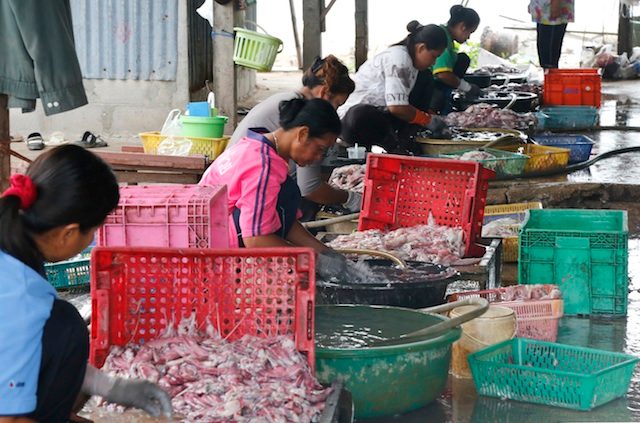SUMMARY
This is AI generated summarization, which may have errors. For context, always refer to the full article.

PARIS, France – Thailand went on a charm offensive in defense of its prawn industry this week, seeking to convince Europeans that it is responding to allegations of slavery and torture in its fisheries sector.
The fishing industry accounts for 40% of Thai exports of food products and is a mainstay of the economy.
But its image has been badly damaged by accounts of abuse of illegal immigrants held captive and forced into unpaid labor, sometimes on boats at sea for years on end without receiving any payment for their work.
Thailand pulled out the stops for the SIAL international food fair outside Paris this past week, sending a delegation replete with officials from the labor and fisheries ministries, plus police and anti-human trafficking experts as well as industry leaders.
They then travelled on to Brussels to lobby EU officials.
“We don’t deny there is a problem,” said Foreign Ministry official Sarun Charoensuwan at a special seminar on the subject.
“A lot of concrete measures are on their way,” Charoensuwan added.
According to a June article by the British daily The Guardian, there is a lot to be done by Thailand’s prawn industry, the world’s largest, which sends about a quarter of its exports to the United States where they are known as shrimp, and 15% to Europe.
The newspaper found the sector relies heavily upon fish meal, which was often supplied by ships using slave labor, to raise the prawns.
It interviewed numerous escapees from ships, fishermen and ship captains who told of the trafficking of unsuspecting workers onto boats where they could end up being exploited for years. The workers had thought they were heading for factory or construction jobs in Thailand.
They recounted 20-hour days and regular beatings for even those who worked hard, as well as torture and execution-style killings.
A 2011 report by the International Organization for Migration found that laborers sold by traffickers to ship captains could end up spending years working on boats without pay or stepping on shore.
France’s Carrefour, the second-biggest retail group in the world, suspended its purchases of Thai prawns in June following the publication of the article in The Guardian. –Rappler.com
Add a comment
How does this make you feel?
There are no comments yet. Add your comment to start the conversation.